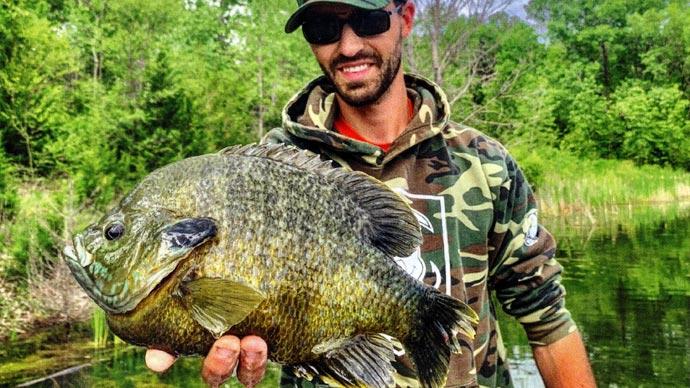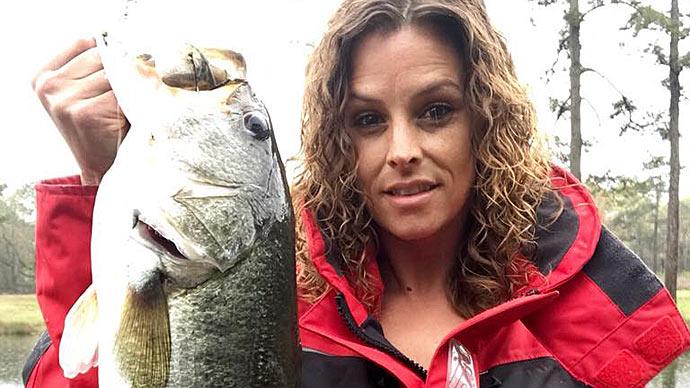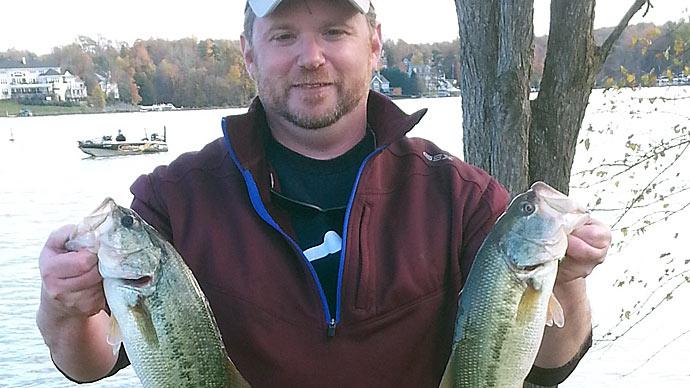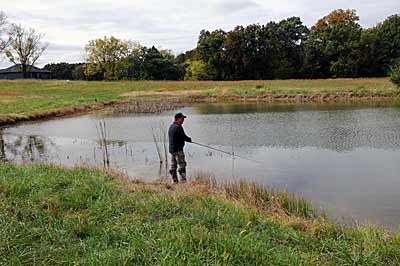
The pitfalls bass anglers encounter on big lakes in the fall are less troublesome when they fish ponds.
Cold fronts, turnover, and fishing pressure from tournament championships create harsh bass fishing conditions on large lakes and reservoirs in the fall, but these pitfalls are minimized when you fish in a pond. Longtime tournament angler Scott Pauley knows ponds are a great getaway place when the big waters are going through tough times in the fall. Ponds also offer excellent bank fishing opportunities for bass anglers who don’t own a boat.
The Missouri Division of Tourism fishing ambassador believes fishing for bass in ponds is consistent throughout spring, summer, and fall. “The great thing about fishing ponds is you have the bass surrounded,” he says. “You have to figure out what they want to eat. Usually, they are pretty competitive, so they will just about bite anything that comes along. Usually, they don’t see a lot of lures, so they are not used to that.”
Cold fronts also affect pond bass, but your odds of catching fish are better than on the big lakes because bass are concentrated in a smaller area and compete all the time for food. “Obviously (a cold front) has some effect,” Pauley says. “When the fish are not biting, they are not biting, but again you can put a lure in front of them so much more effectively because they are in such a limited area. They will often bite to keep some other fish from getting (the lure).”
Ponds also experience the seasonal mixing of the water column in the fall, known as turnover. However, Pauley believes turnover is more severe in the big waters than in ponds because the thermocline created by thermally stratified layers of water during the summer is less pronounced in ponds. He suggests the problem with the turnover on big lakes is that bass scatter after the turnover when oxygen levels are the same in shallow and deep water, whereas in ponds, bass are forced to stay in their limited area. The Missouri angler also notices ponds recover quicker from the turnover than the big waters.
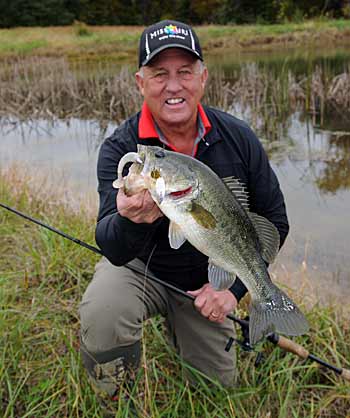
Private ponds owned by a friend or relative usually receive minimal fishing pressure. If you don’t have access to a private pond, numerous public ponds are open to fishing in city and state parks, conservation and wildlife recreation areas, and federal lands. “Just get on the Internet and do some research, and you can find some,” Pauley says.
Most ponds are bowl-shaped shallow bodies of water where bass congregate in the shallows or edges of vegetation. “Bass will lie up near the bank--maybe even within a foot or so of the bank—and they are just watching the edge of the grass for some kind of a bug or something to get close enough to the water to eat it.”
Although grasshoppers, frogs, minnows, and sunfish are the main forage for pond bass, Pauley suggests you don’t need to use lure colors that match the forage. “Those fish are not used to seeing lures, so anything they see to them is something to eat,” says Pauley, who suggests shad-colored baits will trigger strikes from pond bass.
A variety of lures will catch pond bass throughout the fall. Pauley suggests trying topwater lures such as a River2Sea Whopper Plopper, Heddon Zara Spook, Rebel Pop-R, Arbogast Jitterbug, buzz bait, or hollow-body plastic frog if the water is still warm. He likes to throw the largest Whopper Plopper (Size 90) that makes the most noise. “The size doesn’t seem to matter. It’s the noise that is just so obnoxious,” Pauley says. “I don’t think they bite it because they want to eat it; I think it is so obnoxious that they want to kill it.”
The Missouri angler favors a spinnerbait such as the small profile Jewel Gem Blade 2.0 with a Tennessee shad swimbait for active pond bass. A flipping tube Texas-rigged with a pegged 3/16-ounce worm weight is another favorite pond lure for Pauley in the fall. He favors the tube because its slow spiraling fall allows him to fish it effectively in shallow water, and it settles softly on a pond’s mucky bottom, whereas a jig tends to plow into the muck. Pauley recommends two soft plastics for fall pond fishing: a Yamamoto Senko and a Zoom Trick Worm rigged weightless. A lightweight jig also works well in open water areas.
Fishing remains good on ponds throughout the fall and early winter until the water freezes or gets cold enough to make bass lethargic. “We need to remember that ponds cool off a lot faster than the big bodies of water,” Pauley says. “The colder it gets, the slower you need to fish.”
Pond fishing in the fall can produce big bass depending on a pond’s potential to grow quality fish. “Those bass want to eat to store up for winter, and things are cooling down, so you can catch some good ones if the pond is big enough to hold big fish,” Pauley says. “Some of the biggest bass you will catch in your life come from these small bodies of water that don’t get fished hard like the big reservoirs.”


